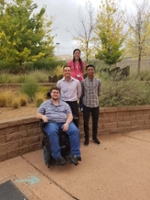Recent News
Engineering a new treatment for ovarian cancer
June 24, 2025
Two UNM engineers receive NSF Graduate Research Fellowships
May 12, 2025
Serendipitous discovery could lead to more efficient catalysts
April 9, 2025
Wei selected as New Mexico Women in Tech awardee
March 7, 2025
News Archives
Fall 2017 Cohort Chosen for Lobo Rainforest I-Corps Program
October 16, 2017
 Of the 10 projects chosen for the NSF I-Corps Program, 3 were developed by students in Professor Heather Canavan's group. The students selected are Phuong Nguyen, Tye Martin, and Ben Matheson. Each student is developing an adaptive design to improve patient experience.
Of the 10 projects chosen for the NSF I-Corps Program, 3 were developed by students in Professor Heather Canavan's group. The students selected are Phuong Nguyen, Tye Martin, and Ben Matheson. Each student is developing an adaptive design to improve patient experience.
Phuong’s project is called “Bubblyte,” is a way to make the preparation required for gastrointestinal imaging more palatable. Currently, the procedure is pretty gross—the viscosity and taste of the preparation mean that patients have difficulty ingesting the material, meaning that only ~half of patients actually are in compliance with screening for this type of cancer. The focus of Phuong’s project is to reformulate the ingredients as a “smart” hydrogel that respond to the pH of the stomach to release the active ingredients, as well as anti-emetics (to prevent nausea) and electrolytes (to prevent dehydration). A provisional patent has been granted for this project, Phuong and Darnell Cuylear (an undergrad in the lab) are currently working on prototypes.
The next two projects are in the design phase. Tye’s project (the “Shower Chaise”) is focused on developing a modular, customizable support system for people with short- or long-term disabilities, allowing them to regain independence when showering. Currently, few options exist for people with vertigo, or who have lost mobility due to strokes and other disabilities.
Ben’s project is focused on creating a better alternative for the prevention of pressure ulcers in patients on bed rest. Pressure ulcers (or “bed sores”) occur in patients who have extremely limited mobility whether at home or in a hospital setting. Current designs to prevent pressure ulcers require large amounts of electricity, and the solutions are large and bulky, which make them difficult to store.Ben’s design will have fewer requirements and will be more economical for use in homes, hospitals and nursing homes.
The $443,631 National Science Foundation grant, announced in August, will provide training and seed funding to approximately 100 teams over the course of the five-year grant. STC CEO Lisa Kuuttila and Innovation Academy Executive Director Rob DelCampo, who are the co-PIs on the grant and responsible for managing the program, are excited to see the first group of participants coming together for entrepreneurial training.
“The management teams at STC and the Innovation Academy, along with invited business community members, evaluated proposals for several technologies and ideas that will be vetted through the I-Corps program for start-up and other commercialization opportunities. The academic and entrepreneurial lead team members will learn first-hand what it takes to start a company from an idea or technology developed for a real market need,” said Kuuttila. “We hope that going through this program will qualify these projects for a second level of funding and training ($50,000) through the NSF I-Corps program and SBIR/STTR programs.”
To increase the economic impact of NSF-funded fundamental research, the National Science Foundation created the I-Corps (Innovation Corps) program to foster innovation among university scientists and engineers. The program teaches them how to validate the commercial viability of their innovations through market analysis and the entrepreneurial process. The ultimate program goal is to create a national innovation network of entrepreneurial inventors who are commercializing their NSF-funded research through new company formation, licensing, strategic partnerships, and bigger private and public funding. Participants who have gone through the I-Corps program have high praise for the process. Visit the Lobo Rainforest I-Corps site to view the video and find out more about the program at http://loborainforest.com/icorps/.
